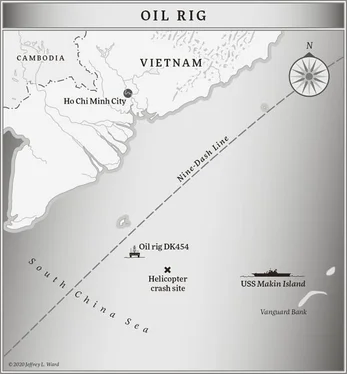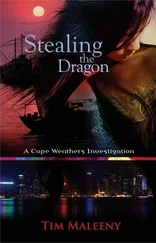Instead of binoculars, Yao used an SLR camera with a zoom lens. So as not to draw attention with them all looking at the same spot, he and Ryan concentrated on the lake and the handful of crewmen who remained aboard Eternal Peach . He panned sideways, bringing the parking lot into view.
Gray clouds had rolled over the mountains surrounding the lake, and a light snow began to fall with the dusk.
“I see him,” Chavez said. “Tall guy in the blue parka.”
“Yep,” Adara said. “That’s the one. No idea if he’s who we’re looking for, but he’s definitely zigzagging to stay in the black with the cameras.”
“Adam,” Chavez said. “Tell me you don’t think that guy is Han Chinese.”
“He’s not Uyghur,” Yao said after a moment. “You’re right. He is Han. Maybe mixed blood.”
Chavez took a deep breath, let his binoculars hang against his chest, thinking. “The Wuming are separatists,” he said. “I’d assumed anyone associated with them would be Uyghur.”
“That’s two of us,” Yao said. “But this makes a hell of a lot of sense. The authorities rarely even stop Han citizens at checkpoints. When they do, the scrutiny is light. This could explain how they’ve stayed hidden.”
“He’s stopped to talk to another guy at the hotel,” Adara said. “Taking a smoke break …”
“Keep an eye on him,” Chavez said.
Yao swung the camera back toward Eternal Peach, pausing now and then to snap photos. The falling snow, tree-covered mountains rising straight up from the shores of the crystal blue lake and into the clouds—he had no shortage of subjects.
Adara gave a peaceful sigh. “Best surveillance ever …”
Yao’s phone buzzed in his pocket.
It was Foley. A call from the director of national intelligence would have been an anomaly a week ago, but she’d taken the idea of a mole personally. Where everyone else with a corner office in D.C. delegated to the nth degree, Mary Pat Foley rolled up her sleeves and went to work. It was easy to see why the President relied so heavily on her counsel.
“Can you talk?” she asked as soon as he picked up.
“Yes, ma’am,” Yao said, mouthing Foley’s name to Chavez so he’d know the call was important enough to take in the middle of a surveillance op. “Just taking in the sights. May have a line on one of those guys we wanted to talk to.”
The line was secure, but Yao spoke cryptically out of habit.
Foley did not.
“You’re in the black?” she asked. “No one is looking at your face right now?”
“No, ma’am …”
Deep breath on the line. “Adam, Leigh Murphy has been killed.” She waited a beat for him to digest the news, then said, “I read the ops report you sent in yesterday. We have to consider the strong possibility … no, probability, that Leigh’s death is related to what you’re doing.”
Yao rubbed a hand across his face, felt his pulse throb in his neck.
“A robbery?” he asked, already knowing it was not.
“I’m sorry, Adam,” Foley said. “Another case officer was murdered as well, Joey Shoop. Police found his body in the city, we think in the location where Leigh was abducted. A couple of teenagers stumbled on her in one of those abandoned Soviet artillery bunkers.”
Yao gazed out across the water, dizzy, like he might throw up. “Shit!” He shook his head. “I’m the one who asked her to interview Beg. This is my fault.”
“No,” Foley said, her voice weighed down with the exhaustion that came from knowing heavy things. “It is not. I hate to tell you this on the phone, but you need to know. Leigh was tortured before she died, methodically and extensively. Toxicology screen is still preliminary, but the coroner contracted by the embassy found traces of ketamine, midazolam, and scopolamine in her system.”
“Dissociatives,” Yao whispered. “Interrogation drugs. This is absolutely my fault. They wanted to know what she learned from Urkesh Beg … Someone should check on him—”
“He’s disappeared,” Foley said. “Could he have had something to do with this?”
“Not from the way Leigh talked when I spoke with her,” Yao said, thinking how that had been just the day before.
“Listen to me carefully,” Foley said. “Whoever killed her wanted information, and we have to assume that they got what they were after.”
Yao chewed on his bottom lip, trying to steel himself against the sudden flood of emotion. Everyone eventually broke under interrogation. Resistance training was about holding out long enough that your handlers could change codes or get assets to safety. No one was expected to hold out forever, not when drugs were involved.
“The mole got her killed,” Yao said, clenching his teeth. “SURVEYOR must be someone who has access to my field reports.”
“You’re partially right,” Foley said. “We’re doing our best to wall you and what you’re doing off from the rest of the intelligence community—for obvious reasons, including the team you happen to be working with.”
“But?”
“But there’s another way SURVEYOR could have found out.”
“How?”
“We’re working on that now,” Foley said. “I’ll be able to let you know next time we talk.”
“Don’t shut me out,” Yao said, knowing he was overstepping his bounds, making demands of a member of President Ryan’s cabinet, not to mention his closest adviser. “Please.”
“You’ll be in the loop the whole way,” she said. “Now we don’t have much to go on. According to my contact at RENEA”—Albania’s counterterrorism squad—“a woman in an apartment overlooking the alley where police found Joey Shoop’s body saw a tall Chinese man in a long coat wearing what she called a ‘gangster hat.’”
“That’s the same general description we got from the Russian woman who escaped the bakery massacre in Huludao,” Yao said.
“Looks that way.” Foley paused again to let him process. She was good that way. A beat later, she said, “We have to assume this guy with the hat is extremely dangerous, and that he’s looking for Medina Tohti. If he knows you went there looking, he may already be there as well.”
Yao agreed to call Foley back with a situation report as soon as was practical, and she agreed to let him know if any new information popped up about Leigh Murphy’s murder.
“Listen up,” he said over the net as soon as he ended the call. “We have a situation.”
“I don’t like this,” Jack Ryan, Jr., said after Yao gave them the news. “Lisanne’s out there on her own.”
“Keep trying her phone,” Chavez said. “She’s probably just in a spot with no service.”
“I really want to meet this tall guy with a hat,” Adara mused, still on her binoculars. “He’s—”
She stopped short, watching the hotel. “Smoke break’s over. Our guy is taking a trail off the back lot, heading for the tree line.”
Chavez let the binoculars hang around his neck, thinking, rubbing his hands. The temperature was falling fast as darkness settled in. The Uyghur in question wasn’t that far away, maybe two hundred yards, but the shadows along the edge of the forest rendered him almost invisible to the naked eye.
Yao was clearly preoccupied with the information about his friend’s death. Chavez understood. It was natural to want retribution. Justice. That would come later. Yao was professional enough to know that. He just needed time to process, time they didn’t have.
“What’s back there?” Chavez asked, giving him something to focus on.
Yao snapped out of his stupor for the moment. “Hemu Village. Beyond the hotel to the east. Cattle farms, log houses, very rural, smack in the middle of a nature preserve. The village itself is ten miles away or so, but the map shows several cabins scattered throughout the forest.”
Читать дальше











![Александр Ирвин - Tom Clancy’s The Division 2. Фальшивый рассвет [litres]](/books/417744/aleksandr-irvin-tom-clancy-s-the-division-2-falsh-thumb.webp)
